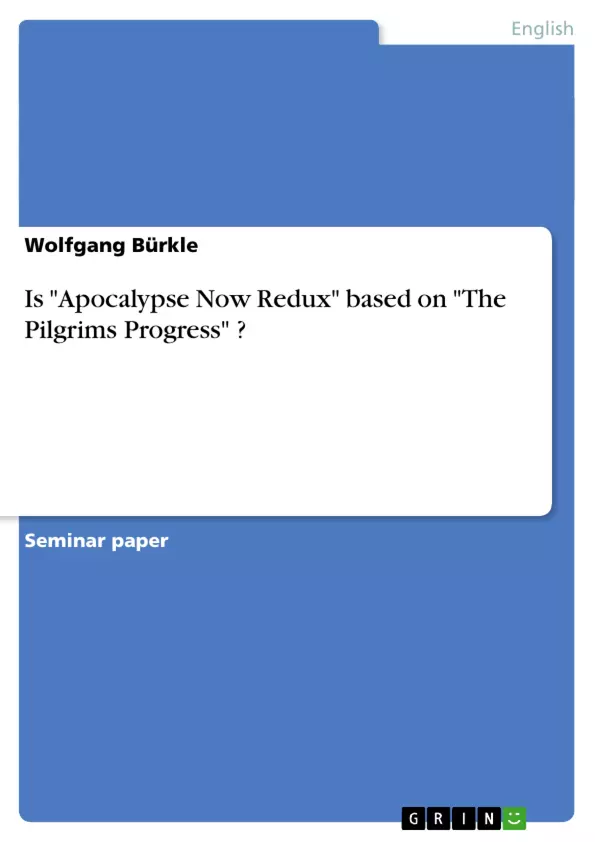Die vorliegende Arbeit vergleicht das Buch "The Pilgrims Progress" von John Bunyan mit dem Film "Apocalypse Now Redux". Beide Werke bieten unter anderem Parallelen hinsichtlich des Reiseverlaufs und der charakterlichen Entwicklung der Hauptfiguren.
Inhaltsverzeichnis (Table of Contents)
- Introduction
- About The Pilgrim's Progress
- About Apocalypse Now Redux
- Christian's Journey compared with Willard's Journey
- The House Beautiful Compared with the French Plantation
- Vanity Fair Compared with Kurtz's Compound
- Conclusion
- Works Cited
Zielsetzung und Themenschwerpunkte (Objectives and Key Themes)
This seminar paper analyzes the similarities between John Bunyan's The Pilgrim's Progress and the film Apocalypse Now Redux, arguing that the latter draws inspiration from elements of the former. The paper focuses on how both narratives utilize the journey motif to depict the transformation of their respective protagonists, comparing specific scenes and characters from both works to highlight thematic connections.
- The journey motif and its role in character development
- The contrast between spiritual and physical journeys
- The influence of external encounters on internal transformation
- The exploration of temptation, danger, and the human condition
- The depiction of a "hellish" journey in both narratives
Zusammenfassung der Kapitel (Chapter Summaries)
The introduction sets the stage by comparing the journeys of Christian in The Pilgrim's Progress and Captain Willard in Apocalypse Now Redux. The paper then explores the allegorical nature of Bunyan's work and the historical context of the Vietnam War, which serves as the backdrop for Coppola's film. The following chapters analyze specific scenes and characters from both works, highlighting their similarities and drawing parallels between Christian's search for salvation and Willard's mission to assassinate Colonel Kurtz.
The first comparative analysis focuses on the journeys of Christian and Willard, drawing parallels between their motivations, encounters, and transformations. The House Beautiful and the French Plantation are compared in the second chapter, examining the role of these settings in both narratives and their proximity to the metaphorical "hells" of Vanity Fair and Kurtz's compound.
Schlüsselwörter (Keywords)
The paper focuses on the themes of journey, transformation, allegory, salvation, and the human condition, drawing comparisons between John Bunyan's The Pilgrim's Progress and Francis Ford Coppola's Apocalypse Now Redux. Key characters and settings analyzed include Christian, Captain Willard, Colonel Kurtz, the Celestial City, Vanity Fair, the House Beautiful, and the French Plantation.
- Arbeit zitieren
- Wolfgang Bürkle (Autor:in), 2002, Is "Apocalypse Now Redux" based on "The Pilgrims Progress" ?, München, GRIN Verlag, https://www.hausarbeiten.de/document/11129


